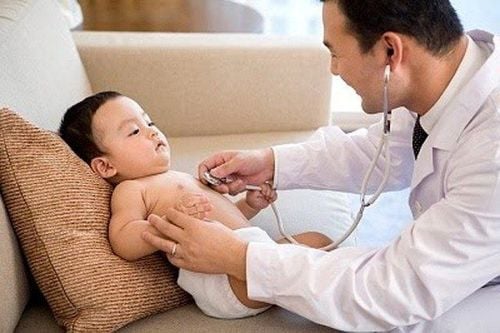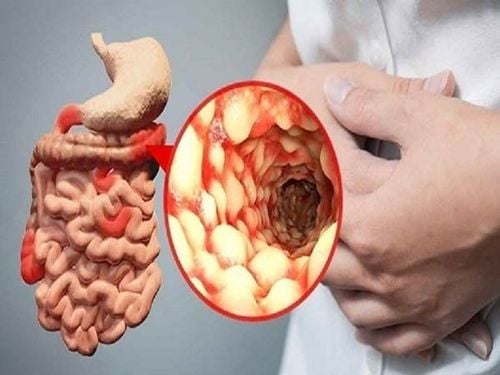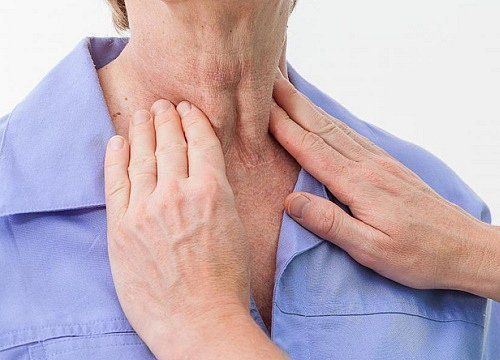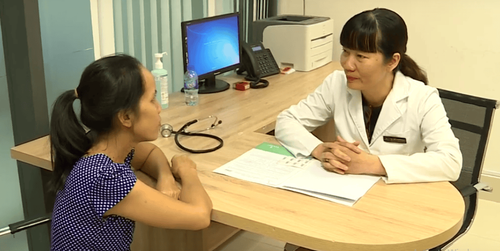This is an automatically translated article.
The article was professionally consulted by Specialist Doctor I Nguyen Duc Vien - Cardiologist - Cardiovascular Center - Vinmec Central Park International General HospitalSymptoms of children with ventricular septal defect are often growth retardation. If not detected and treated promptly, the disease can cause many dangerous complications.
1. What is a ventricular septal defect?
Ventricular septal defect is a congenital heart disease. The wall between the two ventricles of the heart is called the interventricular septum. The interventricular septum has a complex structure consisting of the membranous part, the muscular part, the receiving part and the funnel part.Babies born normally do not have a hole in this septum, so the blood of the two ventricles does not mix. When there is a hole forming between the two ventricles, it is a ventricular septal defect.
2. Types of ventricular septal defect are common in children
Based on the structure of the interventricular septum, there are 4 common types of ventricular septal defect in children such as:
Membranous septal defect
Myocardial septal defect or ventricular septal defect near the apex of the heart
ventricular septal defect receiving part
ventricular septal defect funnel or ventricular septal defect under the aortic valve or below the pulmonary valve
3. Manifestations of children with ventricular septal defect

Trẻ hay khóc khi ăn, biếng ăn, ăn kém, chậm hoặc không phát triển mạnh
● Blue skin, especially around the nails and lips.
● The child has difficulty breathing or cries when eating, is anorexic, has poor appetite, is slow or does not thrive.
● When children are active, they get tired quickly, have difficulty breathing or have fast breathing.
● The child has swelling in the legs, ankles and feet.
Fast heartbeat.
● In many cases, children don't have any symptoms until a physical examination and find out, or there are cases when the child is an adult. By this time, the disease has progressed and there are signs or symptoms of heart failure, such as shortness of breath. Children with severe ventricular septal defect often have signs and symptoms from the first days of life or in the first months of life. Symptoms of children with ventricular septal defect are often seen as: shortness of breath or rapid breathing, children eat poorly or refuse to eat, children quickly get tired, when they have pneumonia, they often relapse many times.
Other manifestations depend on the size of the ventricular septal defect.
4. How to treat ventricular septal defect?
Depending on the examination results and the doctor's instructions, different types of ventricular septal defect will have different treatment methods, the treatment should be based on factors such as: age, hemodynamic , lesion pathology and response to medical treatment.
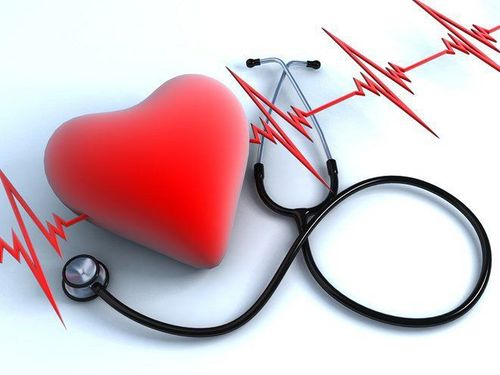
Can thiệp đóng thông liên thất qua da
There are 3 methods of ventricular septal defect treatment, which are: medical treatment, open heart surgery and intervention to close the ventricular septal defect.
● Medical treatment with heart medications, diuretics and ACE inhibitors.
Surgical treatment or open heart surgery depends on the location and size of the orifice (eg, large hole causing pulmonary hypertension), the patient does not respond to medical treatment, has a different pathology associated with a ventricular septal defect with pulmonary stenosis or with aortic regurgitation.
For cases that have not had surgery (or do not need surgery), after surgery, it is necessary to prevent complications of infective endocarditis.
Intervention to close the ventricular septal defect may only be indicated in certain cases.
5. Examination and treatment of ventricular septal defect where?
Vinmec Central Park Heart Center is one of the key centers of Vinmec Health System, gaining JCI global certification. The center is equipped with many modern equipment such as: a modern cardiovascular operating room (Operation Room) that allows performing surgical techniques with high accuracy. 3 Tesla MRI scanner, 640 series magnetic resonance imaging machine... have helped diagnose and treat cardiovascular diseases effectively.
From July 2019, Vinmec Central Park International General Hospital applies a full-service cardiovascular disease treatment model. Cardiovascular package treatment program (BUNDLE PAYMENT) will be applied with one of 4 techniques: Percutaneous aortic valve replacement (TAVI intervention); Placement of coronary interventional stents; Aortic bypass surgery and ventricular septal surgery. When there is an indication for cardiovascular treatment with one of the above 4 methods, the patient will be consulted to choose and sign a contract to use the appropriate method. The contract covers the treatment method, length of hospital stay, number of follow-up visits, and a fixed cost. During the contract treatment period, the patient does not have to pay extra costs.
The outstanding advantages of the package cardiovascular treatment program include:
Multi-specialty treatment: Patients will have a comprehensive and thorough treatment plan by a multi-specialty team, coordinated from many areas; The treatment regimen is standardized according to the standards of prestigious cardiovascular associations in the world; Patients have direct access to the most appropriate and optimal regimen, avoiding the need to test many different treatment methods that are costly or reduce the effectiveness of treatment; Increase recovery, reduce hospital stay; Peace of mind about the treatment plan and proactive about treatment costs; The team of doctors at Central Park Heart Center includes professors, doctors, leading experts in the field of Cardiology such as: Professor, Doctor, Doctor Vo Thanh Nhan; Doctor, Doctor Nguyen Luong Tan; Master, Doctor Nguyen Duc Hien ...
Vinmec Central Park Heart Center has successfully treated over 98% of cases of TAVI intervention, open heart surgery, painless open heart surgery by technical combination. ESP, effective even with severe, elderly cases. Vinmec Central Park is also the first hospital in Vietnam to be recognized as an independent American standard TAVI intervention center.
Among congenital heart defects, ventricular septal defect is common in neonates. Children with ventricular septal defect, if detected and treated promptly, will limit the complications caused by the disease.
Please dial HOTLINE for more information or register for an appointment HERE. Download MyVinmec app to make appointments faster and to manage your bookings easily.




